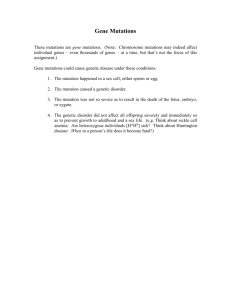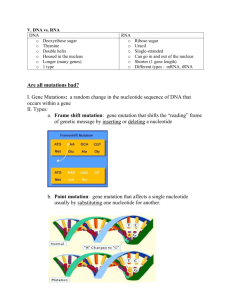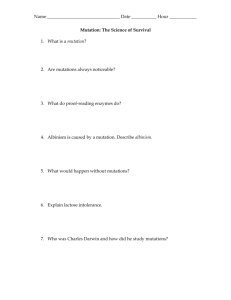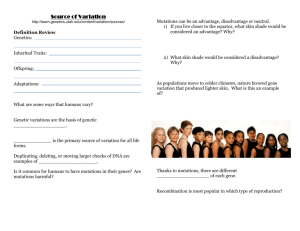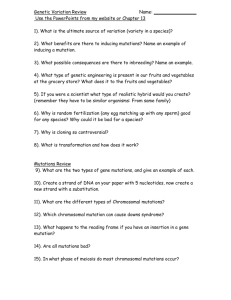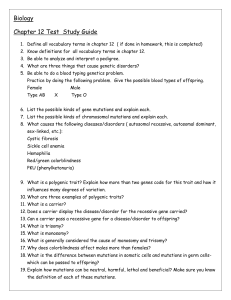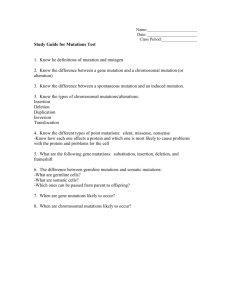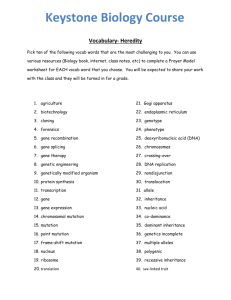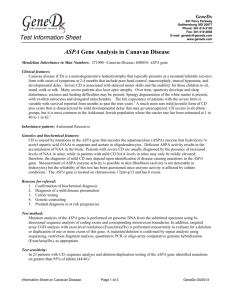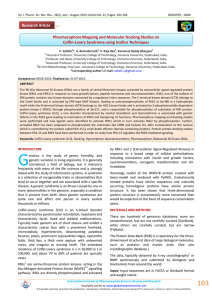Information Sheet - The Coffin
advertisement
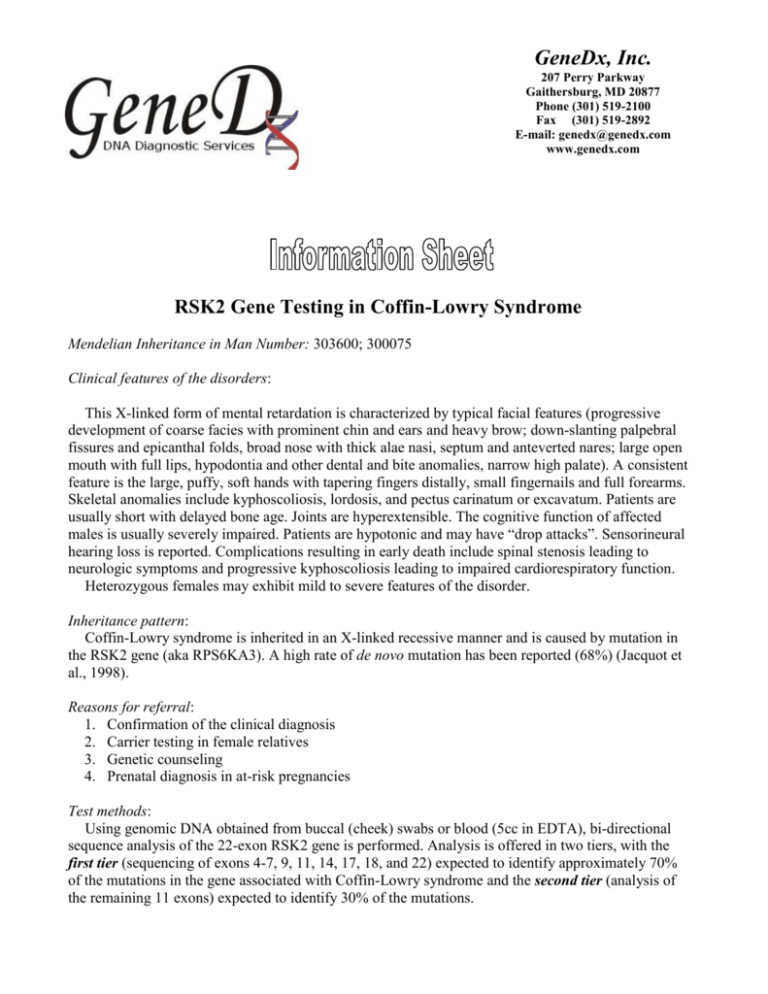
GeneDx, Inc. 207 Perry Parkway Gaithersburg, MD 20877 Phone (301) 519-2100 Fax (301) 519-2892 E-mail: genedx@genedx.com www.genedx.com RSK2 Gene Testing in Coffin-Lowry Syndrome Mendelian Inheritance in Man Number: 303600; 300075 Clinical features of the disorders: This X-linked form of mental retardation is characterized by typical facial features (progressive development of coarse facies with prominent chin and ears and heavy brow; down-slanting palpebral fissures and epicanthal folds, broad nose with thick alae nasi, septum and anteverted nares; large open mouth with full lips, hypodontia and other dental and bite anomalies, narrow high palate). A consistent feature is the large, puffy, soft hands with tapering fingers distally, small fingernails and full forearms. Skeletal anomalies include kyphoscoliosis, lordosis, and pectus carinatum or excavatum. Patients are usually short with delayed bone age. Joints are hyperextensible. The cognitive function of affected males is usually severely impaired. Patients are hypotonic and may have “drop attacks”. Sensorineural hearing loss is reported. Complications resulting in early death include spinal stenosis leading to neurologic symptoms and progressive kyphoscoliosis leading to impaired cardiorespiratory function. Heterozygous females may exhibit mild to severe features of the disorder. Inheritance pattern: Coffin-Lowry syndrome is inherited in an X-linked recessive manner and is caused by mutation in the RSK2 gene (aka RPS6KA3). A high rate of de novo mutation has been reported (68%) (Jacquot et al., 1998). Reasons for referral: 1. Confirmation of the clinical diagnosis 2. Carrier testing in female relatives 3. Genetic counseling 4. Prenatal diagnosis in at-risk pregnancies Test methods: Using genomic DNA obtained from buccal (cheek) swabs or blood (5cc in EDTA), bi-directional sequence analysis of the 22-exon RSK2 gene is performed. Analysis is offered in two tiers, with the first tier (sequencing of exons 4-7, 9, 11, 14, 17, 18, and 22) expected to identify approximately 70% of the mutations in the gene associated with Coffin-Lowry syndrome and the second tier (analysis of the remaining 11 exons) expected to identify 30% of the mutations. Test sensitivity and mutational spectrum: In one study of 37 individuals with the clinical features of Coffin-Lowry syndrome, SSCP identified mutations in the RSK2 gene in 25 persons (67%) (Jacquot et al. 1998). In another study of 250 patients, SSCP combined with cell function assays identified mutations in 61% of patients (Zeniou M. et al., 2002). It is expected that complete bi-directional sequencing of all exons and the intron-exon boundaries of the RSK2 gene (as performed at GeneDx) would have a sensitivity at least as great as either of these two methods. Mutations occur throughout the coding sequence of the gene and are of all types, including nonsense, missense, splice-site, deletions and insertions. There is no evidence of genotype/phenotype correlation. Mutations resulting in premature protein truncation represent the majority of the mutations. No mutations in the promoter region of the gene have been identified in association with Coffin-Lowry syndrome. There are rare reports of large deletions (involving several exons). Such mutations would be readily identifiable when sequencing a male patient but could be missed when sequencing a female proband. Costs and turn-around time: Mutation detection requires an affected individual and costs $1300 for the first tier. DNA testing of relatives for a known mutation is $350. Pre-natal diagnosis using two samples (CVS/fresh amniocytes and cultured villi/amniocytes) is $700 and takes approximately 10 days. There may be an additional cost for ruling out maternal contamination of the fetal sample when the mother and fetus are found to share the same genotype. For testing a new patient, turn-around time for the first tier of testing is 8 weeks. For pre-natal diagnosis, where the mutation in the family is known, turn-around time is approximately 2 weeks. The second tier of testing, done upon request of the ordering physician if the first tier test is negative, is an additional $1300. Fees are subject to change without notice. CPT codes for RSK2 (tier one) gene mutation test in Coffin-Lowry Syndrome 83891 83898 83894 83904 83892 83912 x 10 units = $100 x 20 units = $500 x 10 units = $100 x 20 units = $500 x 2 units = $40 x 2units = $60 TOTAL = $1300 CPT codes for RSK2 (tier two) gene mutation test in Coffin-Lowry Syndrome 83891 x 11 units = $110 83898 x 22 units = $550 83894 x 11 units = $110 83904 x 22 units = $550 83892 x 2 units = $40 83912 x 2units = $60 Discount less $ 120 TOTAL = $1300 Possible associated ICD9 Codes 318.0 Moderate mental retardation 737.4 Curvature of spine associated with other conditions 754.81 Pectus excavatum 754.82 Pectus carinatum 755.01 Congenital anomaly of fingers Literature sited: Jacquot S. et al. Am J Hum Genet 63: 1631-1640, 1998; Zeniou M. et al. Am J Hum Genet 70:1421-1433, 2002.
